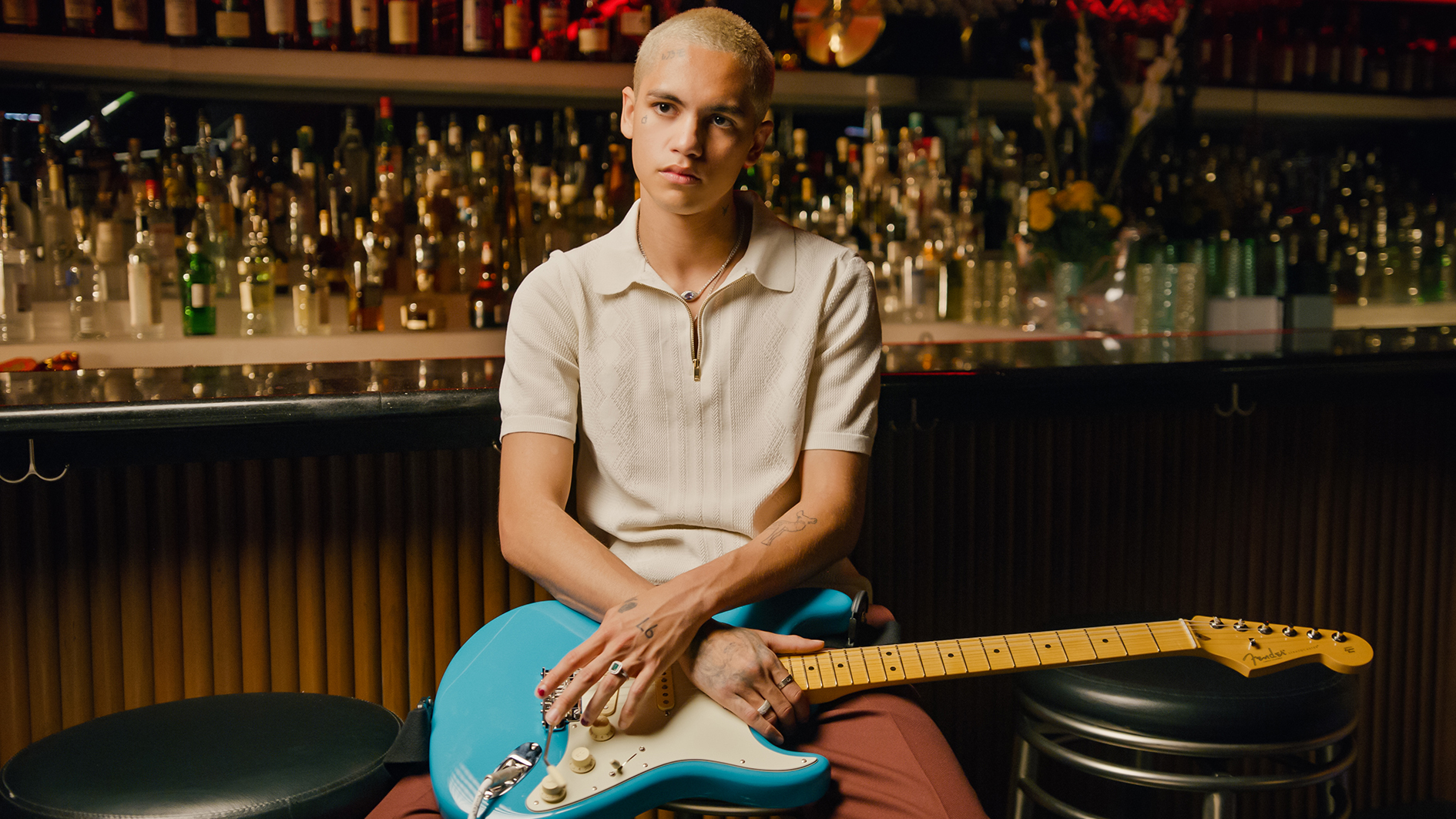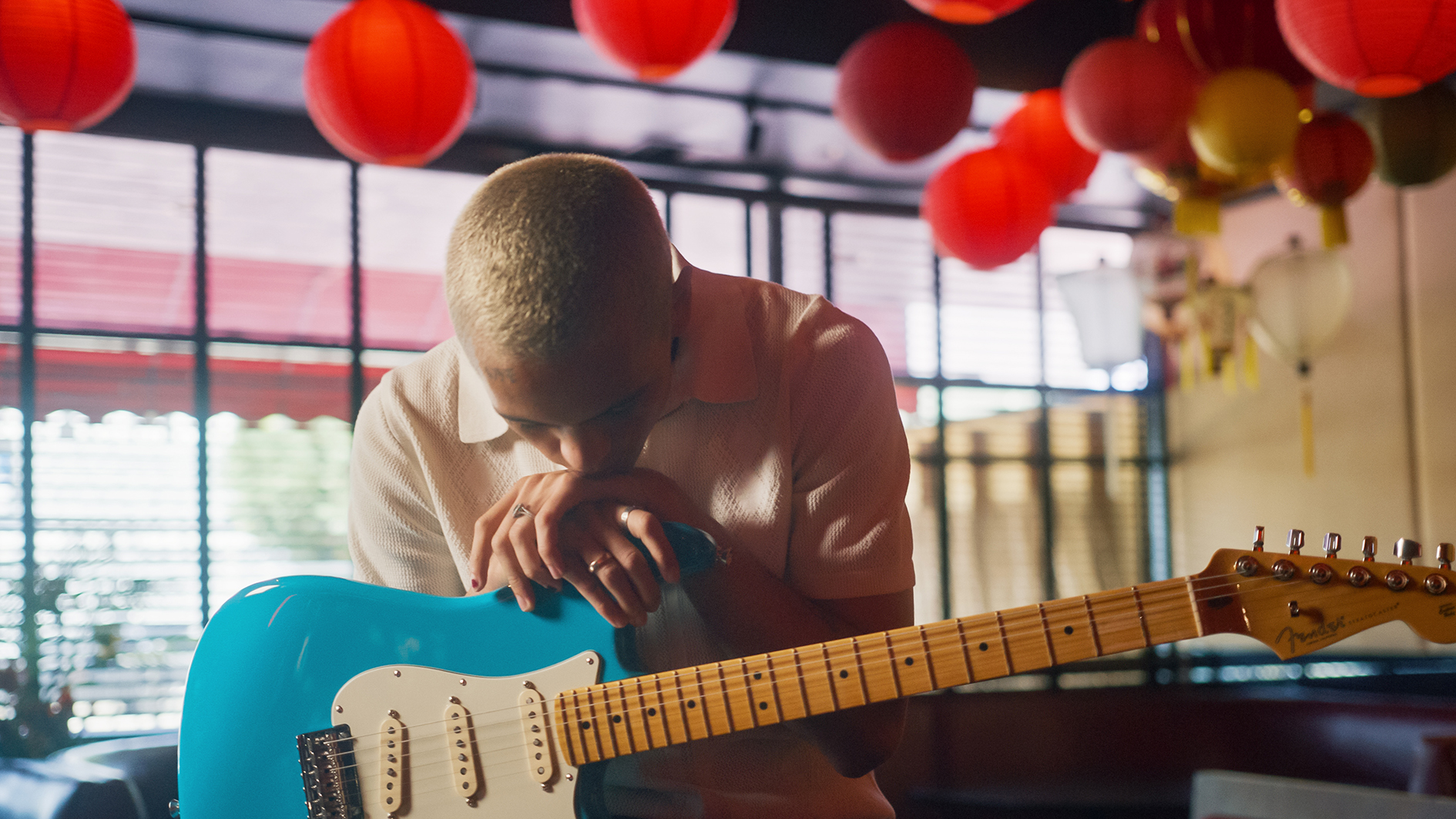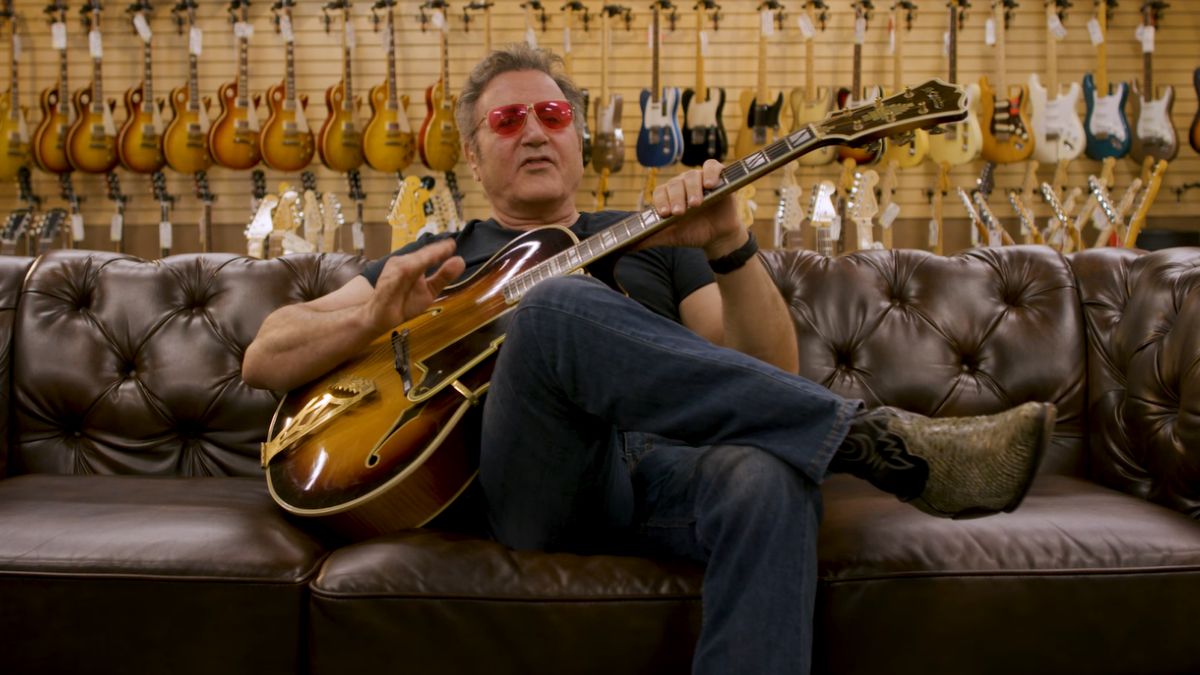Dominic Fike: “When Rick Rubin heard the demos, he said it felt like I was speaking through the guitar”
The Floridian six-stringer talks championing Fender's new American Professional II series, and the theory-free approach to his new album, What Could Possibly Go Wrong

Having already collaborated with Halsey, Brockhampton’s Kevin Abstract and Omar Apollo in his first few years as a solo artist, eventually signing a multi-million dollar deal with Columbia in the aftermath of a record label bidding war, Dominic Fike certainly looks poised for pop stardom.
To coincide with the release of his debut album in July, titled What Could Possibly Go Wrong, he was also chosen as one of the campaign artists for Fender’s American Professional II series.
Considering his very first guitar was a Fender Strat, it’s a dream come true for the young Floridian…
“It’s surreal to be working with Fender like this,” he smiles. “When I got that first guitar as a kid, I instantly knew they were the best. Honestly, it’s been Fender since day one. I’ve got my Miami Blue Strat with me right now in the back of the car because we have rehearsal in about an hour and I’m just on my way there…
“I actually thought I’d initially be getting the black Telecaster, because I love Telecasters and that’s what I’ve been mainly playing recently. Then this showed up and was the Miami Blue Strat and I was a bit like, ‘So it’s not a Telecaster or black?’ and they told me not this time.
“Then I played it and it instantly became my favorite guitar… now I take that thing with me everywhere I go!”
What do you like about the American Professional II models specifically?
Get The Pick Newsletter
All the latest guitar news, interviews, lessons, reviews, deals and more, direct to your inbox!
“It’s got the push/push switching, which is sick. And it plays really well, man. I have an older white Strat at home which is great, but it doesn’t play like this thing! I also love the maple neck, I don’t like the darker ones. I also feel like the neck is thin enough as it is – I don’t need to sand it down.
“I’ve realized I don’t have the biggest hands over the years. I think I was trying to play Every Breath You Take one time and the chords were way too big for me. That was the moment I realized I must have little hands. It was the first time in my whole guitar career I ever felt like that!”
Do you remember the moment you decided the guitar would be your instrument of choice?
“You know, I found a piece of paper from middle school where I had to fill out what I wanted to do. And there was this band with Vampire in the name – it wasn’t Vampire Weekend – but they had this lead guitarist who was all over the place shredding and singing at the same time.
I didn’t really pay attention to what guitars my favorites would play. Like, who is the guitarist from The Strokes and what does he play? I don’t know!
“But the rhythm guy was totally chilling and I thought, ‘I could totally do that!’ So I wrote ‘rhythm guitar’ as my answer. I feel like I can speak through my guitar. I work with session guitarists who are unable to write a note, which is crazy. Playing guitar like this and working with Fender is a dream come true.”
So who would you say are your main influences as a guitarist?
“It sucks to say John Mayer because he’s a PRS guy [laughs]. Though to be honest, I didn’t really pay attention to what guitars my favorites would play.
“Like, who is the guitarist from The Strokes and what does he play? I don’t know! Who is the guitarist from the Pixies and what does he play? I don’t know… probably a Gibson!
“John Frusciante was a huge influence on me – I know all of his licks for sure. Also, when I think about writing choruses, I learned a lot from Weezer! I also took in a lot from Kurt Cobain’s guitar approach. Those are all the things I hear most in my music, older rock stuff like that.”

There’s definitely a sunny side to a lot of your songs…
“Yes! I love how Sublime would a rap a bit and mix it up. I love that Santeria tune. I was listening to them a lot on boats and shit. Because I grew up in Florida a lot of my heroes had that beachy kind of sound – or half-beachy and half-party music with some hip-hop in there, whether they knew it or not.
“I think some of my influence comes from living in a fuckin’ tourist area. You walk past a bunch of malls and they’re playing all kinds of different shit for different people. Also my mom listens to anything… so I blame my mom.”
So it’s more songwriters than your typical guitar hero types?
Drunk people would be like, ‘Play Stairway To Heaven, play Stairway To Heaven!’ I just wanted them to shut up so eventually I learned it and could play that shit backwards.
“Yeah, I didn’t really listen to Prince, Van Halen or Jimi Hendrix until very recently. Though I did listen to an unhealthy amount of The Beatles and Led Zeppelin when I was younger. That must have subconsciously hit me at times. It’s hard to explain exactly how Jimmy Page influenced me… it was so long ago I was listening to him.
“I just remember being at parties or going to bars with my mom and always having a guitar with me. Drunk people would be like, ‘Play Stairway To Heaven, play Stairway To Heaven!’ I just wanted them to shut up so eventually I learned it and could play that shit backwards.
“From then on, I started listening to more Led Zeppelin. I think the way they approached second lines, like lead lines, definitely taught me something.
“Same with John Frusciante, he’s amazing at that stuff. And with John Mayer, it’s more about structure – I learned a lot of chord progressions from him. I listen to a lot of boring guitarists too, like Jack Johnson. Well, he’s not boring, but it’s more of a simple take on chord progressions.”
Then there’s the rap side of it all, too. Which artists helped shape your sound?
“Outkast for sure. André 3000 used to do things that were all over the place. Eminem was a huge inspiration too, especially he used to make really funny songs. Which is how I started out, writing funny stuff.
“Max Martin used to write these melodies but talk about farts or poop, there was no real pressure on the lyrics.
“So me and my friends would write poop songs all the time. And a lot of them were really good, they had bounce. Even Whose Line Is It Anyway – that TV show – seemed to inspire me somehow. I guess I like cross-genre stuff because I find different things interesting.
“I feel like I could score a movie. I can manipulate sounds – I realized that at a super-young age, just coming up with a beat and turn it into music. My dad had this four-track mixer thing, so I’d load my ideas into that and hope it made sense.
“One of the first things I did was cover the song Fireman by Lil Wayne! I feel like all my songs are parody songs.”
I feel like I could score a movie. I can manipulate sounds, I realized that at a super young age, just coming up with a beat and turn it into music
Tell us more about your current rig…
“I was using my Kemper every day to record, there was this Chandler amp I really liked. My pedalboard is really simple, there’s some Electro-Harmonix reverb and this pedal called the Dream Machine. I didn’t know anything about it – I found it in some vintage pedal shop… which I’m actually going to later today to pick up an auto-wah.
“Recently, I’ve also been using this plug-in called the [Neural DSP] Archetype… that shit is amazing. I’ve just started using it and had no idea it would be that good.”
How did you end up discovering it?
“I was with Kenny Beats and he was letting me plug in and run through sounds. They blew me away and I had to ask where the fuck he was getting those tones and it was the Archetype.
“I can make my electric sound like an acoustic with all the verbs and delays I have. I have a couple of crunch sounds through one like Screamer pedal. I really need my wah – I don’t think I realized how necessary it was. I want my solos to sound crazy and tasteful at the same time!”

Some of your music utilizes pentatonic scales and seventh chords. Does theory play a part in your writing or is it more experimental in nature?
“There’s no approach. I don’t know any theory at all, I don’t really know what chords I’m playing! I just saw the shapes people were using and learned which ones to copy. My friend Ben taught me one chord that I love, it’s a dominant seventh that I like to play a lot.
“Whenever I get into a session, I always ask people what’s the coolest chord they know. I’ll learn it and then try to find another three that match it, then another four… and suddenly I have eight.
“I remember Rick Rubin said something to me when he heard the demos, he said it felt like I was speaking through the guitar, and not many people seem to do that anymore.
“When I hear the chords, I’ll instantly sing the melody and that’s it… that’s all I do. I don’t know anything about the guitar, really. I just play that shit. I do occasionally try to look up things, online lessons or theory stuff, or even ask people.
“But as soon as they start talking, I just don’t get it. Maybe because it kinda makes it all boring. Every time I pick up the guitar, it feels new to me… because I don’t know shit about it. I have my habits for sure but I really don’t know much.”
For more information on the American Professional II Stratocaster, head to Fender.
Amit has been writing for titles like Total Guitar, MusicRadar and Guitar World for over a decade and counts Richie Kotzen, Guthrie Govan and Jeff Beck among his primary influences as a guitar player. He's worked for magazines like Kerrang!, Metal Hammer, Classic Rock, Prog, Record Collector, Planet Rock, Rhythm and Bass Player, as well as newspapers like Metro and The Independent, interviewing everyone from Ozzy Osbourne and Lemmy to Slash and Jimmy Page, and once even traded solos with a member of Slayer on a track released internationally. As a session guitarist, he's played alongside members of Judas Priest and Uriah Heep in London ensemble Metalworks, as well as handled lead guitars for legends like Glen Matlock (Sex Pistols, The Faces) and Stu Hamm (Steve Vai, Joe Satriani, G3).
"They said, 'We don't have a direction yet, but you got the gig!' I said, 'Well, let me think about it'": Yngwie Malmsteen on why he turned down UFO
“I loved working with David Gilmour… but that was an uneasy collaboration”: Pete Townshend admits he’s not a natural collaborator – even with bandmates and fellow guitar heroes










![[from left] George Harrison with his Gretsch Country Gentleman, Norman Harris of Norman's Rare Guitars holds a gold-top Les Paul, John Fogerty with his legendary 1969 Rickenbacker](https://cdn.mos.cms.futurecdn.net/TuH3nuhn9etqjdn5sy4ntW.jpg)


